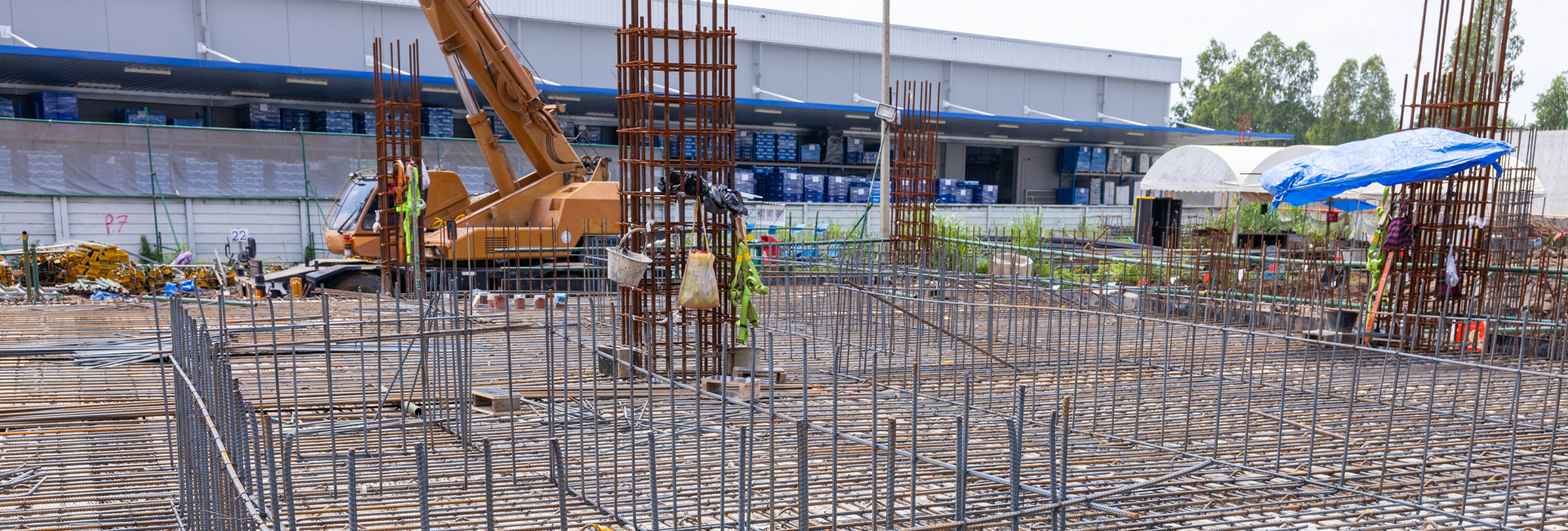The construction industry has grown by leaps and bounds since the industrial revolution. The structures we see around us and the progress in transportation is a testament to the development of the country. One of the core materials that has made construction on this economical and social scale possible is TMT rebars. Let’s explore more about TMT rebars in the next sections.
|
Table of Content
|
What is TMT Rebar?
TMT rebars are an acronym for Thermo Mechanically Treated Bars. These bars are made with a process that combines cooling and heating effects to strengthen the bars. The resultant bars offer high flexibility and core strength. These bars are used to strengthen concrete in a process called RCC – Reinforced Cement Concrete.
The quality and grade of any TMT rebars are defined by their manufacturing process. This process begins by choosing high-quality steel. The steel is then passed through a furnace to manage its composition. The molten steel is then poured into molds forming long, rectangular steel billets. The next step of the process involves passing the steel billets through rolling mill stands—this aids in the extension of the TMT rebar. Water is then poured on these TMT rebars to strengthen their core and improve tenacity. This unique process of dousing bars in water is known as quenching. This process is what lends TMT rebars their characteristic tough exterior and soft interior. The last step involves atmospheric cooling, where bars are cooled at room temperature.
This extensive process leads to the manufacturing of high-quality TMT rebars. Let’s further understand why TMT rebars have gained popularity over normal steel bars. Read on.
What is the difference between a TMT Rebar and a normal steel bar?
It’s hard to imagine a time before TMT rebars. After all, these bars have become so popular in the world of construction. Yet there was a time when normal or mild steel bars were used in construction. Structures were made of iron rods and concrete. This use of mild steel bars posed multiple problems, the primary one being rusting. This is one of the reasons why TMT rebars began to be widely used. The other differences between TMT rebars and normal steel bars are:
Diameter – Mild steel bars have a round cross-section with diameters ranging from 6mm to 50mm. Such steel bars can only be used in small-scale construction projects. TMT steel rebars can be made in different diameters. This characteristic allows it to be used efficiently in all forms of construction – from small-scale to large-scale.
Carbon Density – Carbon composition in steel bars is an important indicator of the bar’s weldability. Normal steel bars have a low carbon count but are still prone to more cracks. TMT rebars have an even lower carbon composition that improves weldability with no cracks at the joints. This makes these bars more reliable and durable.
Corrosiveness – Mild steel or normal steel is not highly resistant to corrosion. This leaves the structure vulnerable to internal corrosion and rusting, which weakens its core. Long-term corrosion can also affect the durability of the structure. TMT rebars, on the other hand, are highly resistant to rusting owing to the unique Thermo-Mechanical treatment. This improves the longevity of the structure.
Tensile Strength – Tensile strength means the load bearing capacity of a bar. Normal steel bars don’t have high tensile strength, making them less resistant to earthquakes and strong vibrations. This means that mild steel bars cannot be used in seismic zones. TMT rebars have a composition of Sulphur, carbon, and phosphorous. These chemicals improve the tensile strength of the structure and make them resistant to earthquakes.
Fire Resistant – Structures need to be fire resistant to protect and guard their inhabitants. All building materials need to have some level of fire resistance. While normal steel bars are non-combustible, they cannot withstand high temperature. TMT rebars, on the other hand, can handle temperatures up to 400*-600* C and are fire-resistant.
Types and Grades of Steel Reinforcement Bars
As discussed, the manufacturing process of TMT rebars is what lends it its characteristic grades. There are different grades of bars used for different purposes. Here’s an overview of the types and grades of steel reinforcement bars.
Grade FE 415 – These types of TMT rebars have higher malleability and lengthening. Owing to these characteristics, such bars are often used in RCC projects. These offer high earthquake resistance, making them ideal for use in seismic zones.
Grade FE 500 – This grade of TMT is highly resistant to corrosion. This is why such bars are often used near beachfront or flood-prone areas. Apart from these, Grade FE 500 bars are also used in the construction of bridges, skyscrapers, and large-scale projects.
Grade FE 500D – These bars are highly flexible and malleable. Making them ideal for use in modern and unique structures. Architects often prefer these bars when constructing novel structures. These bars are also able to withstand high pressures, thus ensuring the strength of the structure Is not compromised.
Grade FE 600 – High tensile strength is the strongest USP of this grade of TMT rebars. These bars are used in projects that demand high durability. These include RCC development projects, large-scale infrastructure projects, and more.
Advantages of TMT Rebars
Greater Strength – The core reason for using TMT rebars is its advanced strength. These TMT rebars bond tightly with concrete, making them ideal for use in construction.
Cost-effective – Despite the many coveted properties, TMT rebars are surprisingly cost-effective. Irrespective of the grade you purchase, TMT rebars offer high quality at reduced prices, making it the ideal construction material for builders.
Fire & Corrosion Resistant – TMT rebars are resistant to corrosion. This is a characteristic that adds durability to the structure. It also improves the safety of the structures. In addition, TMT rebars are fire resistant and can withstand high temperatures. These properties add to the overall safety of the structure.
Load-bearing capacity – TMT rebars have a high load bearing capacity which makes them ideal for use in large-scale projects.
Key Takeaway
TMT rebars have revolutionized the way construction is done in India. These have clearly surpassed the qualities of regular steel bars and offer far more benefits than regular bars. Sree Metaliks Limited is a TMT rebar manufacturer in India that has recognized the inherent strength and demand for TMT rebars. This has led Sree Metaliks Limited to manufacture high-grade, top-quality, and cost-effective TMT rebars. These bars are manufactured using international standards and under the guidance of experts. If you too are looking for cost-effective, durable, and highly ductile TMT rebars, then head to Sree Metaliks Limited.
For more information, please reach out to us at: Sales@sreemetaliks.com

